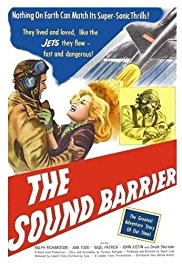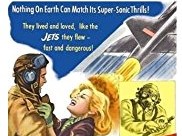The Sound Barrier *** (1952, Ralph Richardson, Ann Todd, Nigel Patrick, John Justin, Dinah Sheridan, Joseph Tomelty, Denholm Elliott, Leslie Phillips) – Classic Movie Review 7086

Director David Lean commendably examines questions of principle in his sombre 1952 film The Sound Barrier telling the stiff-upper-lipped story about aircraft designer JR (Ralph Richardson), a man so obsessed and ruthless that he puts his ambition to break the sound barrier before the safety of his loved ones.
Ann Todd (then Lean’s wife) plays Richardson’s daughter Susan who desperately watches and waits as, in turn, test pilots Denholm Elliott (as Susan’s brother), Nigel Patrick (as her husband), and John Justin (as Philip) dice with death.
While Richardson gives a memorable performance, the others fare less well with Terence Rattigan’s Oscar-nominated Best Story and Screenplay. Lean achieves exciting moments in the air, thanks to some fine flying scenes, but his movie often seems contrived and stultified on the ground, and overall it is good but still one of his lesser efforts.
As expected with a David Lean film, it is technically highly accomplished: there is excellent black and white cinematography by Jack Hildyard, a stirring score by Malcolm Arnold and distinguished sets by production designer Vincent Korda. It won an Oscar for Best Sound, Recording.
And of course it is a vintage plane-spotter’s treat with shots of early Fifties British jets and the Comet airliner, the world’s first passenger jet, lending the film period charm.
It won three BAFTA Film Awards in 1953: Best Film from any Source, Best British Film and Best British Actor (Ralph Richardson).
Also in the cast are Dinah Sheridan, Joseph Tomelty, Leslie Phillips, Jack Allen, Ralph Michael, Donald Harron, Vincent Holman, Douglas Muir, Robert Brooks Turner, Anthony Snell and Jolyon Jackley.
Todd (1909–1993) also played in Lean’s The Passionate Friends (1949) and Madeleine (1950). The duo divorced in 1957.
The Sound Barrier (also known as Breaking the Sound Barrier in the US) is directed by David Lean, runs 118 minutes, is made by London films, is released by British Lion, is written by Terence Rattigan, is shot in black and white by Jack Hildyard, is produced by David Lean and Norman Spencer, is scored by Malcolm Arnold and is designed by Vincent Korda.
© Derek Winnert 2018 Classic Movie Review 7086
Check out more reviews on http://derekwinnert.com


